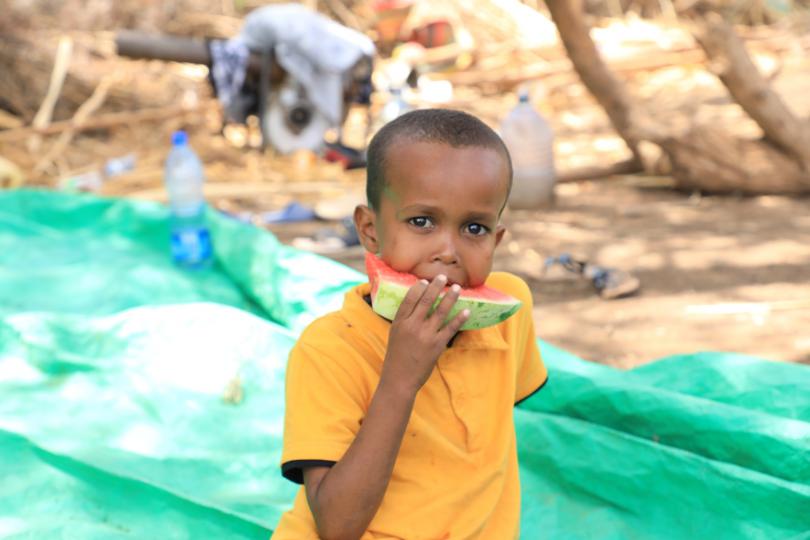FARMING IN GARISSA COUNTY IS HELPING CHILDREN WIN THE WAR AGAINST MALNUTRITION

Sabir and his family enjoying a watermelon from their farm
By Marion Kwambai
In Balambala Sub county Garissa County, we find Sabir and his family sitting somewhere on their farm, sharing a watermelon. Hawa, Sabir’s mother, tells us since Save the Children distributed seeds to them in December last year, they have had two bumper harvests. The first harvest was in February this year where they harvested 5,000 kilos of watermelon. They replanted the seeds and were able to harvest another 3,000 kilos in April. In Garissa, a kilogram of watermelon ranges from 17 to 30 Kenya shillings depending with the market demand.
Alongside watermelon, they have also harvested green maize and replanted some more. Hawa, who is Siyat’s 3rd and youngest wife says they started farming about 8 years ago, and this was the best decision they ever made as a family. She says their life has changed for the better since. Other than constantly having food to eat, Hawa says they also get nutritious fruits and vegetables from the farm; this helps their children get a balanced diet, cutting down the risk of malnutrition.
"Most of our neighbours’ children are severely malnourished because now with the drought, animals do not produce milk. In fact most of them have died and the rest have moved to areas with better pasture,” she says. “We are lucky because we eat 2 or 3 meals a day since food is readily available. Most community members only eat one meal a day because they cannot access or afford it.
Sabir enjoying a watermelon gotten from his father's farm
Hawa further adds that being a large family consisting of 16 children, their farm has been a very important source of income. They are able to cater for other needs of the family as well as buying variety of food such as wheat flour and rice. Siyat tells us that they decided to venture into farming because of unpredictable weather patterns and consistent and prolonged drought. With the money he got from selling watermelon, he is now able to sustain his family comfortably.
"We are now experiencing the fourth failed rainy season. If I did not have this farm, my wives and children would be forced to sleep hungry. We would not have any money to buy food and other basic commodities. The seeds and farm tools have really changed our lives," he explains.
Farming in Balambala is done in farmers’ groups where they farm collectively. Siyat and his wives belong to Saka Youngster Farmers Group, which consists of 28 farmers who own about 20 acres of land. They pump water from the river using a generator and use canals to distribute the water to the farms.
Data from the Ministry of Health (MOH) indicates that in the last year, Balambala Sub-County has recorded 4,375 cases of moderate acute malnutrition and 645 cases of severe acute malnutrition. Siyat is grateful all his children are very healthy.
To support the improvement of farming practices and farm yields, Save the Children with funding from the Bureau of Humanitarian Assistance (BHA) facilitated the training of farmers on land preparation, seeding rate, spacing, Zai pit technology, weeding, post-harvest handling, water management and pest management.
The targeting criteria for the intervention includes households that present low Food Consumption Scores (FCS) and high Coping Strategy indices (CSI), vulnerable women-headed households with more that 75% dependency ratio, and vulnerable households who have been involved in farming activities in the past two farming seasons.
Save the Children provided farm inputs to 350 smallholder farmers in Garissa County in the form of seeds for vegetable crops (jute mallow, watermelon, pumpkin, amaranthus) and staple crops (maize, beans, sorghum) as well as farm tools (hoes, spades, forks racks, machetes, hermetic grain storage bags, watering cans).
Through this project, we hope to see more children under five thrive in Garissa County.
